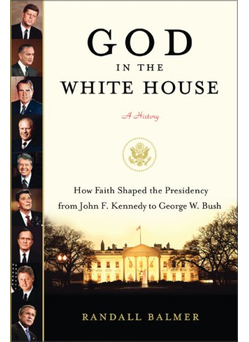Randall Balmer
Historian
Randall Balmer, professor of American religious history at Barnard College, Columbia University, earned the Ph.D. from Princeton University in 1985. He has lectured at the Chautauqua Institution, the Commonwealth Club of California and the Smithsonian Associates and to audiences around the country, and he has been a visiting professor at Rutgers, Yale, Drew, Northwestern, and Princeton universities and at Union Theological Seminary, where he is also an adjunct professor. He has been a visiting professor in the Columbia University Graduate School of Journalism and a visiting professor at Yale Divinity School.
Professor Balmer has published widely both in academic and scholarly journals and in the popular press. He is an editor for Christianity Today, his commentaries on religion in America, distributed by the New York Times Syndicate, have appeared in newspapers across the country, and one of his essays, Adirondack Fundamentalism, appears in the Ninth Edition of The Norton Reader. He has published opinion pieces in the Des Moines Register, the St. Louis Post-Dispatch, the San Diego Times-Union, the Dallas Morning News, Slate, the Philadelphia Inquirer, New York Newsday, the Albany Times-Union, the Nation and the New York Times. His first book, A Perfect Babel of Confusion: Dutch Religion and English Culture in the Middle Colonies, won several awards, and his second book, Mine Eyes Have Seen the Glory: A Journey into the Evangelical Subculture in America, was made into a three-part documentary for PBS. Professor Balmer was nominated for an Emmy for his script-writing and for hosting that series.
His second documentary, Crusade: The Life of Billy Graham, was aired on PBS and also appeared in A&Es Biography series. In the Beginning: The Creationist Controversy, a two-part documentary on the creation-evolution debate, was first broadcast over PBS in May 1995 and then recut and broadcast in fall 2001.
Professor Balmer has co-written a history of American Presbyterians, a book on mainline Protestantism, and another book, Protestantism in America, with Lauren F. Winner. Other books include Encyclopedia of Evangelicalism, published by Baylor University Press, and Religion in Twentieth Century America, part of the Religion in American Life series, published by Oxford University Press. A spiritual memoir, Growing Pains: Learning to Love My Fathers Faith, published by Brazos Press in 2001, was named book of the year (spirituality) by Christianity Today. Professor Balmer recently completed a history of religion and the presidency entitled God in the White House: How Faith Shaped the Presidency from John F. Kennedy to George W. Bush. It will be released by HarperOne (formerly Harper San Francisco) in January 2008.
How did we go from John F. Kennedy declaring that religion should play no role in the elections to Bush saying, I believe that God wants me to be president?
Historian Randall Balmer takes us on a tour of presidential religiosity in the last half of the twentieth century—from Kennedys 1960 speech that proposed an almost absolute wall between American political and religious life to the soft religiosity of Lyndon B. Johnsons Great Society; from Richard Nixons manipulation of religion to fit his own needs to Gerald Fords quiet stoicism; from Jimmy Carters introduction of evangelicalism into the mainstream to Ronald Reagans co-option of the same group; from Bill Clintons covert way of turning religion into a non-issue to George W. Bushs overt Christian messages, Balmer reveals the role religion has played in the personal and political lives of these American presidents.
Americans were once content to disregard religion as a criterion for voting, as in most of the modern presidential elections before Jimmy Carter.But todays voters have come to expect candidates to fully disclose their religious views and to deeply illustrate their personal relationship to the Almighty. God in the White House explores the paradox of Americans expectation that presidents should simultaneously trumpet their religious views and relationship to God while supporting the separation of church and state. Balmer tells the story of the politicization of religion in the last half of the twentieth century, as well as the religionization of our politics. He reflects on the implications of this shift, which have reverberated in both our religious and political worlds, and offers a new lens through which to see not only these extraordinary individuals, but also our current political situation.


